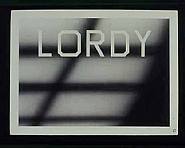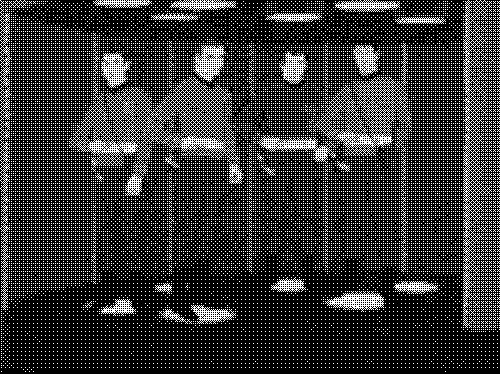View current page
...more recent posts

Ed Ruscha, Lordy,1991, acrylic on paper, 30 x 40.2 inches
Artist vs Programmer: How Low Can You Go?
Saying the "artist vs programmer" discussion is "stupid" (I agree, and I can only take so much of this), my friend David asks:
How low level can one go in this contest...
... did the artist develop the "language" they used to write the program to produce the art...
... did the artist write the compiler which compiles the program into machine code which runs the program which displays the art....
... did the artist build the computer which was used to write the program and run the program...
... did the artist build the components for the computer which was used to write the program to ....
... did the artist manufacture the materials used to fabricate the components used for the computer....blah, blah, blah.
IMHO, it shouldn't matter if the artist is a programmer or not, it is the resulting visual product which matters (unless the artist is into "process" art so in this case, they get all anal about the endless details of how they made such and such widget art object. But then they are really just technicians, much like print makers who only can talk about hand making their own papers from grandma's antique but stained linen bedsheets and using exotic inks made from virtually extinct sea mammals).
FWIW, many programmers feel they are artists as well. They write "elegant," sparse, and minimal code with individual "style." Their code is their art, much akin to poetry.
Pre-developed software is a tool, so are programming development languages. They both are tools which can be used as a means to do interesting things.
I try not to watch any more TV news than I have to, but I gather from the blogosphere ripples that the cable gasbags are going on about John Kerry's use of the word "lesbian." This is just rampant homophobia, and its real purpose is to deflect attention from what we all saw and heard the past couple of weeks, which was John Kerry kicking George Bush's unprepared, possibly medicated ass all over the states of Florida, Missouri, and Arizona. Said gasbags love George Bush, and they've been talking up his assured victory until it became abundantly clear to everyone in the world that when placed side by side with an actual grownup with no handlers to help him (except through that earpiece, which he used poorly) he is by far the lesser qualified candidate. How about that spit at the corner of his mouth in the third debate? And that weird phony smile? Because I haven't been cattle prodded into thinking about the latest faux controversy, those images of a bad dude in free fall are still burned into my mind.

.GIF by jimpunk (from SCREENFULL - always something good going on over there).
More on the coding vs artmaking question. In the comments to an earlier post, Mark contributes these thoughts about imaging and how much can or should be left to humans:
In the process of developing video systems, I've accidentally introduced a variety of bugs that create interesting and unusual visual effects. Often an understanding how the visual and the implementation are tied together has helped me to quickly understand how to correct the implementation to make the effect go away.And my reply:
It seems that going the other way -- understanding how to modify the implementation (sw, hw, algorithms) to create effects -- would give someone more "knobs," more control, more flexibility. But of course, knowing what to do with that flexibility is all the difference.
Something I don't know how to gauge is how much power is needed. I'm amazed by what artists can do with simple tools. I think I would need MatLab to draw a decent sphere.
Some people don't think drawing contributes anything to the arena of so-called advanced art (as that concept originated in the art galleries and continues in new media) while others value it far too much--e.g. the underground economy of painting that thrives in the back rooms of even so-called conceptual galleries, based on supposed authenticity of hand skill. I think the cognitive and perceptual processes associated with drawing have some role to play as art makes its transition from the vine charcoal to the 1s and 0s phase. I really can't say what or why (not succinctly anyway) other than to say that I'm enjoying continuing to draw in a field where no one can tell whether it's computer-assisted or not. (The same comments would apply to anyone with skill on a musical instrument.)
But Mark's comment makes a pretty good case for knowing some code. The problem is up to now artists and musicians have relied on technicians to develop the "knobs," and only after a product is introduced do they get to say which knobs have the potential to expand the visual/audial landscape and which are silly, soon-to-be-dated effects. Unfortunately, to date too many of the artists who code also make crappy art--and I'm talking here mostly about stuff that finds its way into galleries, as opposed to net art that is more "about" coding. The best work is happening at the low-fi end, with the BEIGE crew, say, or the music of Paul Slocum (a post about him soon). Even in Net Art, the most interesting stuff to me is often simple html, GIFs, etc.
I was watching for signs of "the wire" in Pres. Bush's (crappy) debate performance last night. Definitely noticed he had a tendency to look down and to the right, silently, and then pop back up with a statistic or line of argument. Salon got another TV camera screen shot showing the bulge under his jacket. It appears, folks, our President is a cheater. Surprisingly, the
"Top 10 President Bush Explanations For The Bulge In His Jacket:"UPDATE: Text revised after dave reminded me that CBS isn't owned by a defense contractor. That we know of.
10. "It's connected to an earpiece so Cheney can feed me answers--crap, I wasn't supposed to say that."
9. "It's a device that shocks me every time I mispronounce a word."
8. "Just a bunch of intelligence memos I haven't gotten around to reading yet."
7. "Mmm, delicious Muenster cheese."
6. "John Kerry initially voted for the bulge in my jacket, then voted against it."
5. "I'll tell you exactly what it is--it's a clear sign this economy is moving again."
4. "Halliburton is drilling my back for oil."
3. "Oh like you've never cheated in a presidential debate."
2. "Accidentally took some of Governor Schwarzenegger's 'roids."
1. "If Kerry's gonna look like a horse, then I'm gonna look like a camel."
UPDATE 2: According to Dave Lindorff, who's been covering this story for Salon and Counterpunch, the Letterman Top 10 is emblematic that the media intends to treat this story as a joke. The US media, that is. Lindorff says he was interviewed for an extensive story on Bush bulge that ran on international CNN but not in America.
Artist and blogger twhid responds here to the previous posts (1 / 2) on whether it's necessary to know code to make digital art:
I find myself on both sides of this issue.I had hoped to make it clear that the canvas analogy isn't good, since there are decades of theory showing the canvas is a far from neutral surface and the rectangle an inherited convention that can be subverted: much modern art is about dismantling the tools of painting, conceptually, not just physically. Arguably new media art built on this existing conceptual framework of modern and poMo theory--applying its precepts to the computer, video, etc.
On one hand, I donít think itís necessary to be able to program a computer to make digital art.* Especially as the tools to create digital art get better and better. And besides, what is the difference between Windows APIs and the the interface of Photoshop? They both present you with tools to make things happen on a computer.
On the other, I think having programming knowledge is very important (but not necessary) for one to be a digital artist. I would argue that instead of Tomís analogy of a painter grinding his own paint, a better analogy is that a painter must understand how color and 2d form work. For those are the building blocks of a painting really, not the paint. Itís a mistake to confuse a computer for a canvas, to think of it simply as a means to a visual end. A computer does much more than display images on its display. With much new media art the how of image creation is just as important as the images themselves.
+++++++++++++++
*Of course you get into a whole other argument if you do agree: is writing in a scripting language programming? How low-level is the code you program? Is programming in C++ somehow Ďbetterí than programming in Java? etc, etc.
My "grinding paint" analogy was chosen precisely because it invokes the nerdy, irrelevant side of art. It's a Renaissance technology (and accompanying set of problems) that some painters unbelievably still find vital in the modern/poMo era. If knowing how to program results in some extreme refinement that Photoshop couldn't give you but is not visible to any reasonably sized art audience, then who cares about it? Those were the thoughts I had on seeing John Maeda's shows: so he can program? That means he can make more finely adjusted screen savers.
